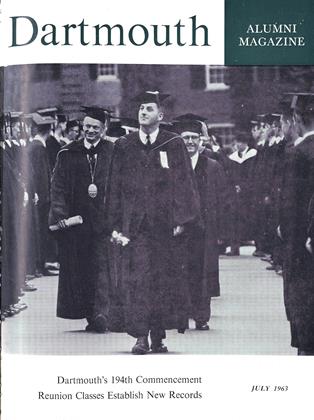By Peter Day'35. New York: Morehouse-Barlow, 1963.174 pp. $3.95.
This is a timely book on an important issue - the fragmentation of The Church into a host of competing churches, labeled by Peter Ainslie more than a half-century ago "The Scandal of Christianity." Since then much has been accomplished as churchmen have learned to combine forces, often rather timidly, in forming Federations, Mergers, Councils among Protestant and Orthodox groups, but with little contact with Roman Catholics. But now all is changed, primarily because of the late John XXIII; this good Pope of peace and unity has convinced the world that all men of good will can live with one another as brothers despite inherited differences. A fresh breeze is blowing; a new understanding is apparent; serious efforts toward a genuine unity are emerging. Peter Day's discussion of the problems involved is a valuable contribution to the dialogue.
Aware of the fact that ancient convictions and habits are not easily altered, the author believes that they must be reexamined in the light of the best Biblical and historical scholarship and also with reference to the growing body of knowledge in our nuclear age. Hence his careful consideration of various elements in the Tradition - creeds and doctrines, sacraments and liturgies and ecclesiastical councils, apostolic succession and Holy Orders, etc. His point of view is primarily that of the Anglo-Catholic Communion (Episcopalian), to which he is rendering outstanding contributions, but he is above all concerned with the Church Universal.
His treatment of early Christianity is original, fresh, and vigorous. His survey of the Middle Ages and the Reformation, though brief, provides a stimulating perspective, necessary for any adequate comprehension of the present. His penetrating analysis of the modern Church contrasts sharply the "what-is" with the "may-become." Perhaps most stirring are the closing chapters on the relevance of the Church to our confused society and the challenge to clergy and laity alike. Every page is illumined by his personal faith in God and in the power of His Holy Spirit to guide the earnest seeker.
As a writer Mr. Day is a master of his craft. The organization of his material is logical, convincing, forward-moving, with good titles and sub-titles. He is skilled in the use of apt illustration, often homely, sometimes humorous, but never flippant. A student of words and their origin, he is extremely helpful in explaining or paraphrasing many of the moss-grown terms in the religious vocabulary. And he knows how to "communicate" to our skeptical generation, for he knows our language and our prevailing attitudes.
The title of the book, Strangers NoLonger, is a phrase from the Epistle to the Ephesians, on which he draws heavily, the New Testament document mainly concerned with the Church Universal. This is not bedside reading, for the subject is too serious and the handling of it too solid to make it an "easy" book. But for those who are really disturbed at our world situation and are turning to the Church for courage and guidance it can be regarded as "must" reading.
 View Full Issue
View Full Issue
More From This Issue
-
 Feature
FeatureThe Second Emancipation
July 1963 By THE REV. JAMES H. ROBINSON, D.D. '63 -
 Feature
FeatureHONORARY DEGREE CITATIONS
July 1963 -
 Feature
FeatureThe Alumni Council's 50th Year
July 1963 -
 Feature
FeatureThe Past Is Prologue
July 1963 By T. DONALD CUNNINGHAM '13 -
 Feature
FeatureA Record-Breaking Reunion Week
July 1963 -
 Feature
FeatureThe Honesty That Is Dartmouth
July 1963 By ALAN KENNETH PALMER '63
ROY B. CHAMBERLIN
-
 Books
BooksA STUDENT'S PHILOSOPHY OF RELIGION
May 1935 By Roy B. Chamberlin -
 Books
BooksTHE CHILD'S WORLD IN STORYSERMONS
November 1938 By Roy B. Chamberlin -
 Books
BooksFROM WHENCE COMETH MY HELP
March 1940 By Roy B. Chamberlin -
 Books
BooksGREAT COMPANIONS,
April 1942 By Roy B. Chamberlin -
 Books
BooksTHINK ON THESE THINGS,
May 1942 By Roy B. Chamberlin -
 Books
BooksEARLY ENGLISH CHURCHES IN AMERICA
November 1952 By ROY B. CHAMBERLIN
Books
-
 Books
BooksFraternity, Published Monthly
MAY 1930 -
 Books
BooksFaculty Articles
November 1945 -
 Books
BooksCHRISTIANITY AND THE FAMILY.
January 1945 By Amdrew G. Truxal. -
 Books
BooksFrom the Tower Room Looking East
OCTOBER 1966 By E.C. BEER -
 Books
BooksTHE WEST COAST OF SOUTH AMERICA
July 1941 By H. Wentworth Eldredce '31 -
 Books
BooksOLIVER GOLDSMITH.
February 1958 By JOHN HURD '21

